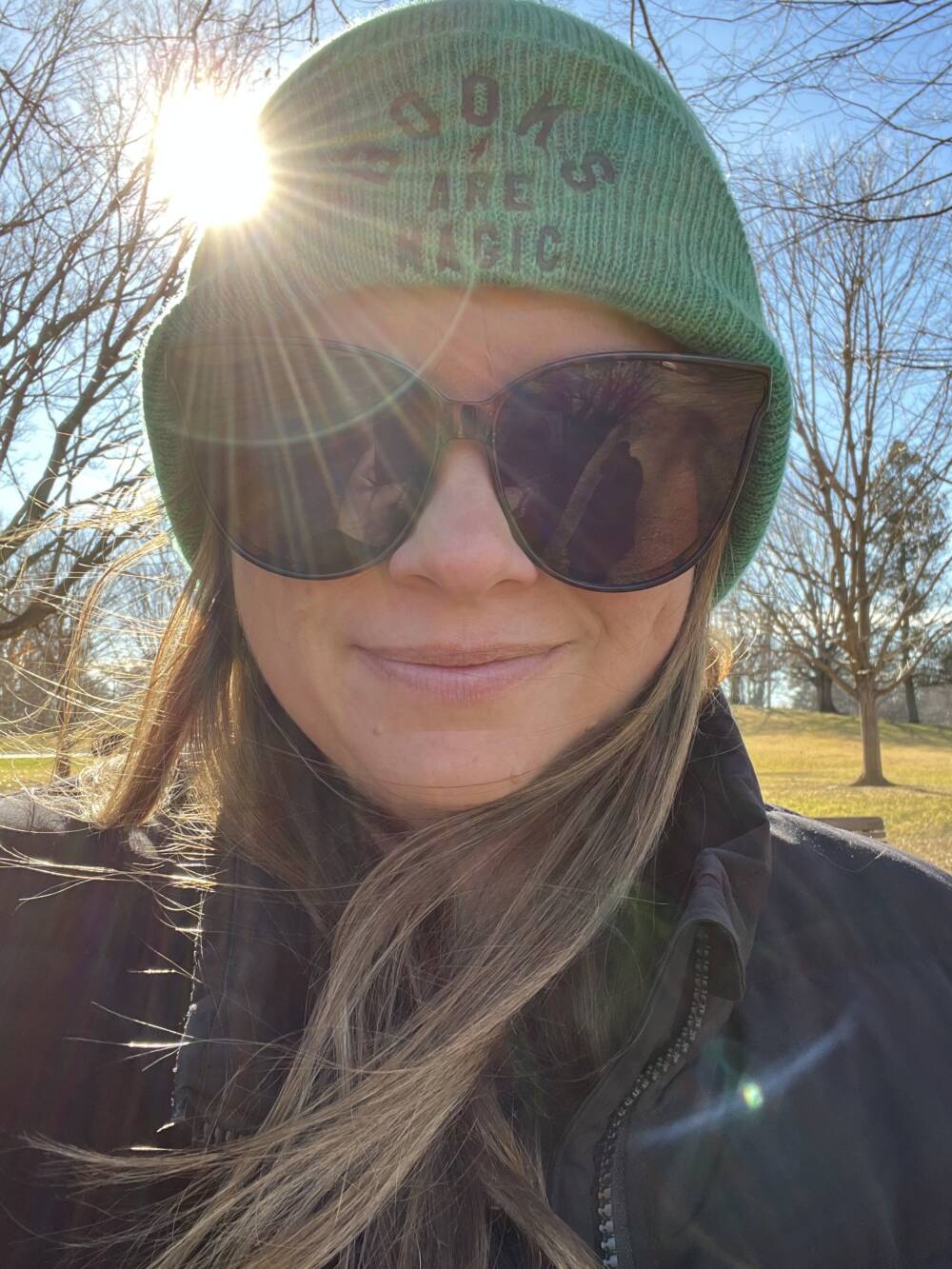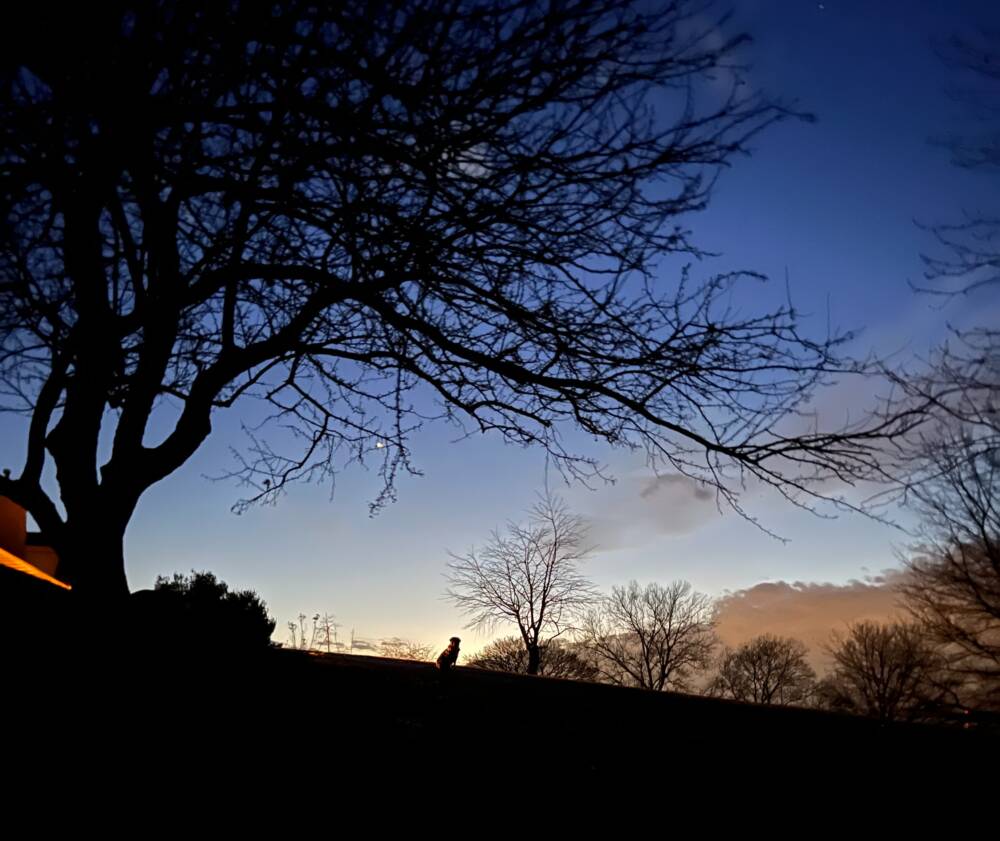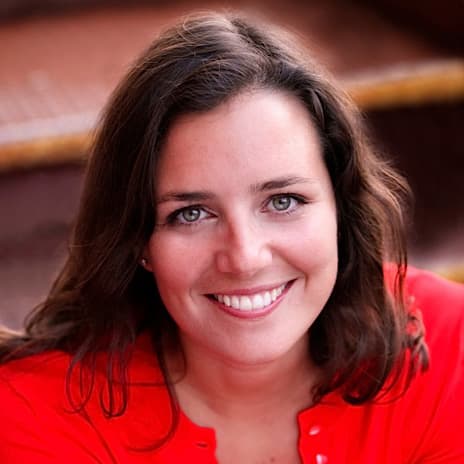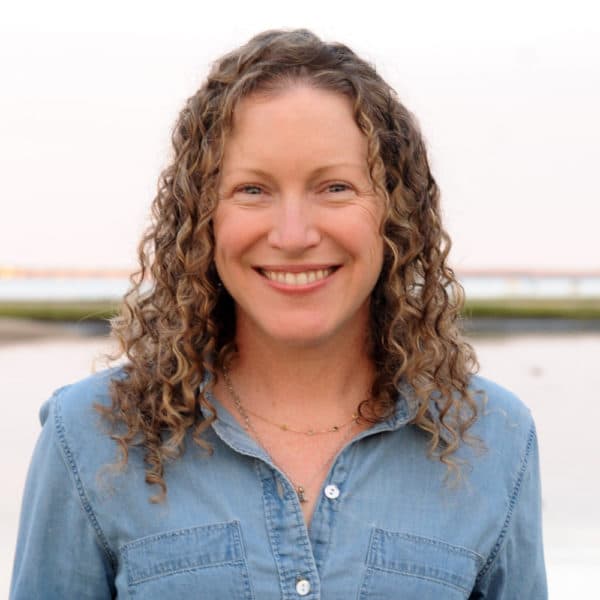Advertisement
Commentary
Kate Baer has always been a writer
Resume
Editor’s note: Kate Baer is a three-time New York Times best-selling author. Baer’s poetry found a following during the pandemic, when millions of women were struggling to balance work and caregiving. She has long been clear about what having childcare has meant to her own career: “I can't do a single act of writing or creating or thinking about writing unless I have childcare. Without that, there's nothing.”
Today, Baer is known for her poetry. But she also writes essays and fiction, and is at work on a screenplay. “I don't want to box myself into one category,” she says. “I never could have predicted ten years ago that I would write books of poetry, so I really try not to limit myself in what comes next.”
Cog talked with Baer in advance of her appearance at “Redefining motherhood for the 21st century,” an event at WBUR’s CitySpace. This essay, which has been edited for length and clarity, was excerpted from an interview with Baer. An audio version of this piece was broadcast on May 10, 2023.
"I’ve always been a writer"
I’ve always been a writer. In second grade, I used to write lots of poems and essays about my cats, dead and alive. I recently found those and started looking through them.
My mom always told me I was a writer, but I didn't realize it until I found those [poems] about 25 years later.
I graduated college with an English degree. I did all sorts of jobs after I graduated: cleaning out the homes of dead hoarders, working at an IT desk, nannying, cleaning out dorms, doing all sorts of things with my English degree that had nothing to do with English. But all the while, I kept writing.
After I got married, I applied to the MFA of my choice and was accepted, which was really exciting. My husband was headed to medical school. I saw us each pursuing our careers — and then I got pregnant.
We decided together that I would stay home and he would go to medical school. It was a difficult decision, but it was also a very exciting time. I'd always wanted to be a mother and I was excited to kind of pursue writing in a different way — which was very naive in some ways, because I had no idea what it was going to take from me to be a mother.
What broke the boat?
Two weeks before my husband was scheduled for a vasectomy, I found out I was pregnant with my fourth.
I'll never forget that moment. I was immediately devastated, because already having three children, I knew the cost of what was to come. I knew the cost on my career. I knew the cost on my body and my mind.
Am I going to drown -- lose my life -- or am I going to completely change everything?
It was a tipping point, that entire pregnancy and then his [my son’s] babyhood.
I had this decision to make. Am I going to drown — lose my life — or am I going to completely change everything?
I credit him, that last baby, all the time for these books. And that came with child care. That came with saying to myself, I can't be a stay at home mom. I can't be a mom to another baby full time. It'll kill me.
I think a lot of women experience shame with this emotion — and I really understand that — but I did not experience shame, only because I was so far past shame; I was in a survival state where I felt: I cannot even breathe, another day, and do this again.
I felt like I had to save myself for the sake of my children. It was the only way forward — to write and to no longer be a stay at home mom.
On Writing, "What Kind Of Woman"
When I started writing “What Kind Of Woman” I had four young children — six people living in a 1,200 square foot house. There was not one room, one desk for me to write at without noise, so I found my home in Panera because of the free Wi-Fi, a comfortable booth and nobody bothering me.
When I sat down to write “What Kind of Woman” it was as if 10 years of bottled up emotion was just waiting to be released.
It's not that it wasn't difficult. But the feeling behind it, the depth behind it, the core of “What Kind of Woman” came so quickly and so easily, as if this voice had just been waiting to come out in the right format.
Writing that book is unlike any other writing I've done before or since then, because it felt like it was just something that had been waiting to be written.
Writing after the success of "What Kind Of Woman"
I felt a tremendous amount of pressure after “What Kind of Woman” when I sat down to write “And Yet.” I thought, how am I going to do this? Without rewriting the same book again, because I didn't want to do that.
I really had to think back about my favorite artists, musicians, actors, writers, performers. All of those people are women who are willing to take risks. Phoebe Waller-Bridge comes to mind. Lizzo comes to mind. Even Lena Dunham, for all of her missteps — when she wrote “Girls,” it was so different from anything we'd ever experienced, and it kind of shifted how we approached women's bodies on television.
It took some time for me to get silly again, to get my head back in the clouds, to let that go and kind of approach “And Yet” as a completely new book.
I wanted to evolve as a writer and also meet myself where I am now. I've changed so much in my 30s, and going into my 40s, now, I feel so different than who I was even five years ago — in my body and in who I am as a writer, as a woman, as a wife, as a mother. All of those roles are continually changing. And so [in that book] I wanted to start there.
I'm writing my next book now and I have no idea where it's going. No idea at all. But I think I'll figure it out along the way.
I really found my voice in poetry. I love the boiled down storytelling. I love everything about it.
I never in my wildest dreams would have thought, when I'm 33, I'm going to become a poet.
I really found my voice in poetry. I love the boiled down storytelling. I love everything about it. I’ve found it in every journal I've ever kept my entire life. But I never felt like I could be a poet. I felt like you had to be a certain kind of person. So I always dismissed it.
I always pictured a poet as a grad student wandering Greece, smoking a cigar, wearing a tweed jacket. Definitely a man, definitely a trust fund, not a 34, now 39-year-old mom who likes Taco Bell.
'Fear of failure does not spare anyone'
I know I can speak through poetry now, and I feel so comfortable there. But I don't just want to be comfortable. I don't want to box myself into one category.
I think the reason a lot of people don't pursue their passion or their career or their art is this fear of failure. And the fear of failure is very important to an artist in the process; it’s something that does not spare anyone.
The thing about the fear of failure is that on the other side of that is not trying.
The thing about the fear of failure is that on the other side of that is not trying. And to me, that's so much worse because not trying — it means you did nothing at all. And to get to the end of your life, never trying, to me, felt so sad and so depressing.
'Just let it be said'
I'm not a morning person. I don't write in the morning, but I am alive at night.
And those evening walks are so integral to letting my mind quiet down enough to hear what's really being said. It's when my mind can get quiet and there's no distractions, no kids, no technology, nothing.

On these walks I really try to let whatever is kind of rolling around in there, just let it be said. If it's sad, be sad for a minute; if it's silly, if it's sexy, if it's happy, whatever it is, just let it be said. And it's really hard to do that in the world today.
Usually when I'm walking in the evening, I'm with my dog, who needs to get out her energy.
We live in the country now, so I walk in this back field, and she just gets to run free off leash. I don't know if you've ever watched a dog run off leash, but it’s very life giving, actually.
We do it rain or shine. When I unclip her, she runs off through the field, and every day is the best day of her life because she's doing what she's meant to do. And it always fills me with this sense of joy.
I'm a huge introvert. I value my quiet time so much, but when I'm on stage and meeting people, I feel that same way. Oh, this is what I was meant to do. I was meant to connect with the audience. I was meant to write for the audience. I was meant to be with women as much as possible.
This is what I was always meant to do and feel and be.
This is what it means to feel known. And I think that’s a very universal desire. To be known exactly as you are and have that be enough.
The audio version of this piece was produced by Cloe Axelson, with help from Sara Shukla, David Greene and Dan Mauzy. It was mixed by Caleb Green.
This segment aired on May 10, 2023.

